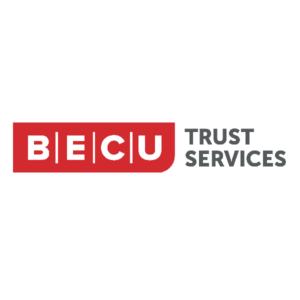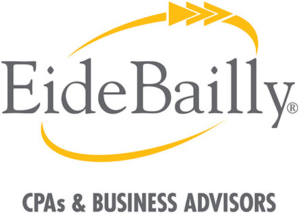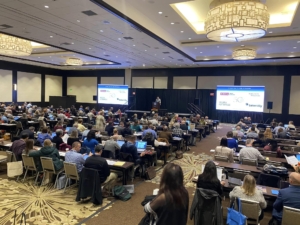2024 Premier Sponsors
Session Descriptions
Our sessions offer continuing education credits for the following professions: Accountant (CPA), Attorney (CLE), Certified Financial Planner (CFP), Certified Professional Guardian (Washington), ABA Certified Trust and Fiduciary Advisor (CTFA), Certified Corporate Trust Specialist – CE (CCTS), Paralegal
Thursday, November 7
Federal Tax Update, 8:30 AM
Samuel A. Donaldson, Professor and Associate Dean for Academic Administration, Georgia State University College of Law
Atlanta, Georgia
Federal Tax Update
This informative and entertaining kick-off session will recap the important cases, rulings, regulations, and (attempted) legislation from the past 12 months in the areas of federal income, estate, and gift taxes. Specific topics will depend on recent developments but will likely include the estate taxation of corporate-owned life insurance, the constitutionality of a wealth tax, and gift tax aspects of option agreements.
- Learn about recent developments in federal income, estate, and gift taxes
- Advise clients on the impact of recent developments in federal income, estate, and gift taxes on their estate plans
- Recommend strategies based on recent developments in federal income, estate, and gift taxes
Planning with Directed Trusts, 10:50 AM
Michael M. Gordon, Director – Gordon, Fournaris & Mammarella, P.A.
Wilmington, Delaware
Planning with Directed Trusts
Directed trusts have exploded in popularity over the past decade. This session will discuss the statutory framework for the use of directed trusts, practical tips on how best to draft directed trusts and how directed trusts can be used to achieve certain tax benefits in the current estate planning environment.
- Explaining the different statutory structures for directed trusts
- Providing practical guidance on how to draft directed trusts, the different fiduciary roles and who is best to serve in the roles
Explaining tax planning opportunities that are available through the use of directed trusts
Modifying Irrevocable Trusts: Consider TEDRA and Decanting, 12:50 PM
Sarah B. Bowman, Partner, K&L Gates LLP, Seattle, WA
Modifying Irrevocable Trusts: Consider TEDRA and Decanting
Encountering an irrevocable trust that needs modification presents unique challenges. Both Washington’s trust and estate dispute resolution (TEDRA) and decanting statutes offer options to alter provisions of irrevocable trusts in certain situations. Consider the differences between TEDRA and decanting. How do they differ? When should a practitioner consider one over the other? Find flexible options to capture a grantor’s intent and to solve for unforeseen challenges with an irrevocable trust.
- Consider the difference between TEDRA and decanting
- Why might a practitioner consider TEDRA over decanting, or vice versa
- Consider the limits to TEDRA and decanting
Community Property Issues in Estate Planning and Administration, 1:50 PM
William Grady IV, J.D., CLU, CFP, Director, Private Wealth, Baker Tilly US, LLP, Milwaukee, WI
Michael Lum, J.D., Director, Washington Tax Counsel, Baker Tilly US, LLP, Frisco, TX
Community Property Issues in Estate Planning and Administration
This is a comprehensive course that provides an in-depth exploration of estate planning with community property. Key topics will include community property fundamentals, estate planning issues and strategies with community property, and the federal tax implications of community property.
- Understand the principles of community property in estate planning
- Navigate the tax implications related to community property
Understand strategies to manage and transfer community property
Privacy in the Age of the CTA, 3:10 PM
Anthony J. McCormick, Partner, Perkins Coie, Seattle, WA
Steven J. Schindler, Partner, Perkins Coie, Seattle,WA
Privacy in the Age of the CTA
An overview of maintaining client confidentiality and privacy in real estate and other transactions taking into account new federal guidelines regarding beneficial ownership reporting.
- Identify and review privacy planning options
- Discuss and summarize impact of Corporate Transparency Act A
Address legal practice concerns and considerations in light of Corporate Transparency Act
Friday, November 8
Washington Probate & Trust Update, 8:30 AM
Anna M. Cashman, KHBB Law PLLC, Seattle, WA
Washington Probate & Trust Update
This session will cover updates to Washington law for estate planning, trust, and probate attorneys and other professionals. The session will review important legislative updates, including new laws relating to electronic estate planning documents, the Washington estate tax, and family allowance award. The session will also cover important cases from the past year relating to probate and trust litigation and best practices under the Washington Trust and Estate Dispute Resolution Act (TEDRA).
- Identify changes in Washington law relevant to your clients
- Determine opportunities for updating forms and templates used daily in your practice
- Develop client education materials to inform your clients about critical changes in the law
Rubber Hits the Road, Implementing Estate Plans, 9:30 AM
Dawn S. Spratley, VP, Senior Trust Officer, Washington Trust Bank, Seattle, WA
Karolyn A. Hicks, Stokes Lawrence, P.S., Seattle, WA
Rubber Hits the Road, Implementing Estate Plans
A trust officer and litigator/mediator will discuss issues they see when estate plans are implemented, including a discussion on how best to draft estate planning documents to avoid disputes.
- Identify clauses that should be included in most estate plans
- Encourage drafters to weigh the pros and cons of “flexibility” for the fiduciaries
- Provide real life examples of how certain language (or lack thereof) plays out when the plan is implemented.
Late in Life Romance: Estate Planning and Personal Implications, 10:50 AM
Professor Karen E. Boxx, University of Washington School of Law, Seattle, WA
Late in Life Romance: Estate planning and Personal Implications
Late in life romance can occur in a number of settings and can create significant family tension and potential financial risks. The presentation will cover potential remedies for marriages between elderly persons and financial abusers, financial and estate planning considerations that should be considered and addressed when entering into a new relationship or marriage late in life, and rights of nursing home residents to engage in intimate relationships.
- The session will provide drafting suggestions for prenuptial agreement provisions and cover the effects of not planning when entering into late in life marriages
- The session will discuss case law and statutory remedies for marriages motivated by financial abuse
- The session will cover rights of nursing home residents regarding their relationships and the response of nursing home administrations to relationships among residents
Greasing the Squeaky Wheel: Managing Difficult Beneficiaries, 1:00 PM
Lauren J. Wolven, Attorney, Levenfeld Pearlstein, LLC, Chicago, IL
Greasing the Squeaky Wheel: Managing Difficult Beneficiaries
Managing family dynamics is a daily activity for estate planning professionals. Most families have a “squeaky wheel” who disrupts what would otherwise be a smooth ride to resolving any issue. This session will provide some key characteristics to help you figure out why your squeaky wheel is making noise and will offer suggestions for keeping the noise to a minimum.
- Learn to spot common characteristics of substance use disorder, autism spectrum disorder, and common mental health issues.
- Analyze disruptive behaviors commonly stemming from substance use disorder, autism spectrum disorder, and common mental health issues.
- Learn techniques for interacting more successfully with individuals who are dealing with substance use disorder, autism spectrum disorder, and common mental health issues.
Estate Planning Strategies for QTIP Trust Assets, 2:00 PM
M. Read Moore, Partner, McDermott Will & Emery LLP, San Francisco, CA
Estate Planning Strategies for QTIP Trust Assets
The assets of a QTIP trust may be a substantial part of a client’s estate that are subject to estate taxes on his or her death. The provisions of the trust instrument and tax law, however, complicate the use of typical estate planning strategies for QTIP trust assets. This presentation will address the special gift tax and estate tax rules that apply to QTIP trusts and discuss strategies to minimize wealth transfer taxes for QTIP trust assets in light of these special tax rules as well as typical governing instrument provisions and limitations.
- Understand federal estate tax rules that apply to assets in QTIP trusts.
- Develop planning strategies to minimize the impact of estate tax on QTIP trust assets on a surviving spouse’s death.
- Draft useful provisions in QTIP trusts included in estate planning documents to provide flexibility for later estate planning by the surviving spouse.
Conflict of Laws in Trusts and Estates, 3:20 PM
Ronald J. Scalise Jr., John Minor Wisdom Professor of Civil Law, Tulane University Law School, New Orleans, LA
Conflict of Laws in Trusts and Estates
In 2022, the Uniform Law Commission approved the drafting of a new uniform act on conflict of laws in trusts and estates. For the last two years, the drafting committee, with the input from stakeholders and industry experts, has developed a working draft of provisions applicable to trusts and estates issues that cross state and national borders. This session will provide an overview of the committee’s work thus far and seek input at a crucial stage in the project trajectory prior to its completion in 2025 or 2026.
- To explain the current law of conflict of laws in trusts and estates, which is currently exemplified in the largely outdated Restatement (Second) of Conflicts
- To illustrate why current law is in need of update and modernization
- To describe the working approach and draft act of the Uniform Law Commission on Conflict of Laws in Trusts and Estates
Empowering Client Decision-making by Improving RPC 1.14, 4:20 PM
Genevieve Mann, Assistant Professor, Gonzaga School of Law, Spokane, WA
Robert D. Dinerstein, Robert D. Dinerstein LAW, Spokane, WA
Empowering client decision-making by improving RPC 1.14
This session will provide an overview of recent revisions made by Maryland to improve their Rule of Professional Conduct Rule 1.14, as well as a proposal by an ad hoc ABA working group to amend Model Rule 1.14 and its Comments itself. We hope to stimulate a lively discussion on these changes and other possible revisions. In Maryland, the changes de-emphasize Guardianship as a standard response to a client with diminished capacity and seek to incorporate supported decision-making concepts and other reforms in various places in the Rule and its Comments. The changes attempt to clarify what is contemplated by “diminished capacity” to assist lawyers as they work with clients who have a questionable ability to make and communicate decisions and receive and understand information.
- Provide an overview of Maryland changes to their RPC 1.14 and changes proposed by the ABA ad hoc working group
- Analyze the basis for those changes
- Initiate a conversation on the current Washington RPC 1.14
On-Demand
The Oregon Hour - ON DEMAND SESSION
Jessica Baggenstos, Of Counsel, Duffy Kekel, LLP, Portland, OR
Vanessa Usui, Partner, Duffy Kekel, LLP, Portland, OR
The Oregon Hour
This Session is a discussion of Oregon specific estate planning and administration. We will discuss recent developments in the Oregon legislature and case law. We will also discuss Oregon specific estate tax planning and administration laws, including Oregon-only elections for the estate tax marital deduction, the natural resource credit and the natural resource deduction.
- Review legislative updates.
- Provide an overview of relevant recent judicial decisions.
- Discuss estate planning topics that are unique to Oregon, including Oregon estate tax planning related to the $1,000,000 exemption, state-only elections to qualify trusts for the estate tax marital deduction and the estate tax natural resource credit and exemption.
Tax Tango: Charitable Planning Steps to Success! ON DEMAND SESSION
Liz Arnold, CPA, Baker Tilly Advisory Group, LP, Seattle, WA
Tax Tango: Charitable Planning Steps to Success!
Join us for a session tailored for tax and estate professionals, exploring charitable planning strategies. We’ll discuss various vehicles like DAFs, PFs, and trusts, weighing practical considerations to meet your clients’ philanthropic goals.
- Evaluate and compare charitable planning vehicles, including Donor-Advised Funds (DAFs), Private Foundations (PFs), and Charitable Lead/Remainder Trusts, to determine the most suitable option for clients.
- Discuss practical considerations associated with each charitable planning vehicle, ensuring informed decision-making.
- Analyze the advantages and disadvantages of gifting during life versus charitable bequests, considering the implications for income tax versus estate tax.
Businesses and Farms: Traps for the Unwary - ON DEMAND SESSION
M. John Way, Shareholder, Schwabe, Seattle, Washington
Businesses and Farms: Traps for the Unwary
This session will provide attendees with practical guidance for estate planning for owners of closely held businesses and farms, identifying potential issues, and providing practical tips for client interaction and drafting. The session will also give particular focus to practical guidance in the area of planning for owners of agricultural businesses and land, including planning to preserve exemptions for assets of family farms. Presentation will also include 2-3 case studies to facilitate exploration of the issues.
Session Objectives:
- Audience members will account for clients’ businesses and farms when advising clients and drafting planning documents.
- Understand how to guide clients through practical, honest evaluations of their businesses and farms, including their operation, value and disposition (including succession planning).
- Learn examples of common and not-so-common planning mistakes to identify and address potential issues.




